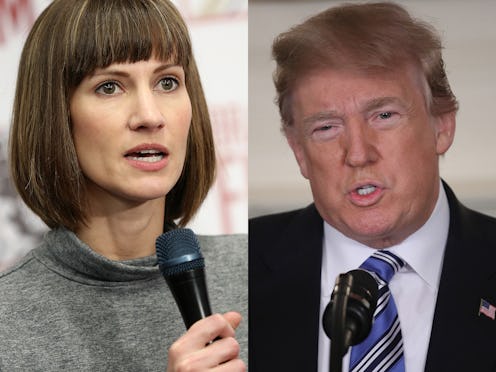News
Trump's Tweets About Rachel Crooks Are Exactly Why Women Don't Come Forward

Rachel Crooks has told the same story for two years: she says Donald Trump kissed her without consent when she was working at Trump Tower in 2006. She told The New York Times before the 2016 election; she told the nation on NBC's Today in December; she continues to tell her fellow Ohioans as she runs for local office now. After a new article came out in which Crooks reflected on whether repeating her story was having any impact, Trump tweeted about Crooks on Tuesday and implied that she was paid to make false accusations against him.
Crooks' story on the front page of The Washington Post set off Trump's morning Twitter tirade. He claimed he didn't know Crooks, repeated his mantra that the Post is "Fake News," and said the alleged kiss "never happened." "Who would do this in a public space with live security cameras running. Another False Accusation," he wrote.
Trump went on to ask why the mainstream media doesn't report on "women taking money to make up stories" about him. He praised a Fox News story alleging women were paid to falsely accuse him of sexual misconduct. This angry reaction to Crooks' allegations isn't new. When The New York Times first reported her story in 2016, Trump reportedly yelled at a journalist on the phone and charged that the paper was making up the allegations. "You are a disgusting human being,” he told the reporter.
After The Time's story was published, the Trump campaign said it's "absurd to think that one of the most recognizable business leaders on the planet with a strong record of empowering women in his companies would do the things alleged in this story."
Trump and his team have vehemently denied Crooks' allegation, as well as the allegations of 18 other women who say Trump touched them without consent. Trump has questioned why many of his accusers waited years to come forward if their accusations are true. Crooks explained to The Washington Post that she questioned whether she had done something wrong. And, at the time, Trump was a famous business man and reality TV host — not the president of the United States.
Myriad factors can prevent women from speaking out about sexual harassment or assault, but Trump's tweets about Crooks exemplify one reason that shouldn't be overlooked. Trump not only called her a liar, he asserted that she was paid by his political enemies to falsely accuse him.
Whether it involves reporting an incident of sexual assault or harassment to the police, an employer, or the public, women don't come forward for fear of retaliation. When it comes to sexual violence not reported to police, 20 percent of survivors say they feared retaliation, according to the Rape, Abuse & Incest National Network. When it comes to work environments, a 2016 Equal Employment Opportunity Commission report says 87 to 94 percent of people harassed on the job don't file a complaint, while 75 percent of those who do report experiencing retaliation of some sort.
Crooks seemed to predict that she would be accused of publicizing her story in order to fill her own pockets. At a December news conference in which she and two other Trump accusers called for a congressional investigation into his behavior, she explicitly said: “I don’t want money. I don’t need a lawsuit." She wanted people to listen — and to care.
Following Trump's tweets on Tuesday, she called on Trump to release the security camera tapes from the elevator bank where she says he kissed her without consent 12 years ago. "Let’s clear this up for everyone," she said.
Crooks is fighting back against Trump's accusations that she's lying for money. Nevertheless, his tweets lashing out at her illuminate why women everywhere are dissuaded from speaking out about harassment or assault they experience. In an attempt to paint his accusers as immoral liars, he highlights why they might have waited until now to come forward.